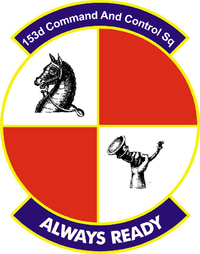| 153d Command and Control Squadron | |
|---|---|
 153d Command and Control Squadron emblem 153d Command and Control Squadron emblem | |
| Active | 2002 – present |
| Country | United States |
| Branch | United States Air Force |
| Type | Command and Control |
| Role | Mobile C2 |
| Part of | ANG/AFSPC |
| Garrison/HQ | F. E. Warren AFB, Wyoming |
| Motto(s) | ALWAYS READY; SOUND THE HORN |
| Colors | Red, Blue and Gold |
| Mascot(s) | Armored Horse |
| Decorations | |
| Commanders | |
| Current commander | Lt Col Eric R. Hill |
The United States Air Force's 153d Command and Control Squadron (153 CACS) is a command and control unit located at F. E. Warren AFB, Wyoming.
Mission
The 153d Command and Control Squadron (153 CACS) mobilizes communications, automated data processing, and combat logistics for United States Northern Command (USNORTHCOM) commanders.
History
4th Command and Control Squadron
Air Force Space Command transferred the 4th Command and Control Squadron (4 CACS) to the Wyoming Air National Guard on 2 July 2002, with the activation of the 153 CACS and the inactivation of 4 CACS.
721st Mobile Command and Control Squadron
The 721st Mobile Command and Control Squadron (721 MCCS) was reassigned from the 721st Support Group (Cheyenne Mountain Air Force Station), to the 90th Operations Group, 90th Space Wing (FE Warren AFB) on 1 July 1999. The 153 CACS inherited equipment and mission from the 721 MCCS when the latter unit was inactivated in 1998.
Logo Significance
The armored warhorse in the upper left quadrant of the shield is the symbol of that elite mobile warrior, the knight. The trumpet, or horn, in the lower right quadrant of the shield represents the instrument of command and control used by ancient armies. Kings and great nobles used the trumpet to call their martial forces to war as well as to control their movements on the battlefield. Thus, the symbols of the mobile warrior and the military horn are significant for the 721st Mobile Command and Control Squadron. Further, the color white on the unit shield traditionally denotes honor while the color red implies valor and even the blood of life or spirit of self-sacrifice.
Both the color red and the horn tie the 721 MCCS to an early medieval legend, that of "Roland and the Horn" at the Battle of Roncevalles in 778. Charlemagne, king of the Franks, began to return home to France across the Pyrenees Mountains while Sir Roland guarded the rear of his army some distance behind. If ambushed by the enemy, Roland had been instructed to blow the trumpet and Charlemagne would charge to his assistance. Roland was indeed attacked, and in overwhelming numbers. Roland faced a terrible decision: if he called in Charlemagne's forces, all of the army faced destruction, or if he did not sound the trumpet Charlemagne and the main army would continue to safety while he and his tiny command would surely die. Gallantly, Roland and his men put the war horn away and prepared to make their last stand. The next day Charlemagne learned of the valiant deed and named Sir Roland the greatest of his knights.
Previous designations
- 153d Command and Control Squadron (1998 – present)
- 721st Mobile Command and Control Squadron (???-1 July 1999)
- 153d Air Control Squadron
Bases stationed
- F. E. Warren AFB, Wyoming (1998 – present)
Equipment Operated
AN/TSQ-194 (1998 – present)
Decorations
- Air Force Outstanding Unit Award

- 1 October 1995 – 30 September 1997 (as the 721 MCCS)
References
- AFSPC Special Order GD-017, 6 July 1999
- "National Guard: "Air Guard outfit takes steps toward the 'Fourth Dimension'"". Findarticles.com. Retrieved 21 September 2013.
- 721 MCCS Significance Statement, Dr. David L. Bullock, 21st Space Wing History Office
- Special Order GD-017, 6 July 1999, Air Force Space Command
- Rogers, B. (2006). United States Air Force Unit Designations Since 1978. ISBN 1-85780-197-0
- ""Guard's mission expands into space," Airman Magazine Web exclusive". Web.archive.org. Archived from the original on 27 January 2006. Retrieved 21 September 2013.
- World Airpower Journal. (1992). US Air Force Air Power Directory. Aerospace Publishing: London, UK. ISBN 1-880588-01-3
- AFSPC Special Order GA-09, 1 November 1997
External links
| United States Air Force | |||||||||||
|---|---|---|---|---|---|---|---|---|---|---|---|
| Leadership |  | ||||||||||
| Structure |
| ||||||||||
| Personnel and training | |||||||||||
| Uniforms and equipment | |||||||||||
| History and traditions |
| ||||||||||
| |||||||||||||||||||||||||||||||||||||||||||||||||||||||||||||||||||||
| |||||||||||||||||||||||||||||||||||||||||||||||||||||||||||||||||||||
| Air Forces |  | ||||||||||||
|---|---|---|---|---|---|---|---|---|---|---|---|---|---|
| Centers | |||||||||||||
| Bases | |||||||||||||
| Stations | |||||||||||||
| Space wings | |||||||||||||
| Air Base groups |
| ||||||||||||
| Squadrons |
| ||||||||||||
